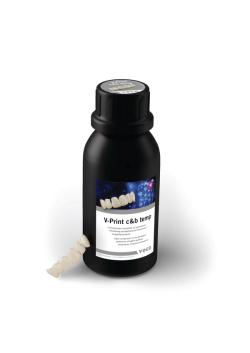- About Us
- Advertise
- Editorial
- Contact Us
- Terms and Conditions
- Privacy Policy
- Do Not Sell My Personal Information
© 2025 MJH Life Sciences™ and Dental Products Report. All rights reserved.
Making 3D printing more convenient
How one dental lab is using multiple Formlabs 3D printers to improve workflows as well as outcomes.
Until about a year ago, the team members at the Idaho-based CMR Dental Lab outsourced all their 3D printing. That worked well for a while, but as the lab continued to grow and as 3D printing became a larger part of their workflow, they decided it was time to invest in their own units.
After doing some research, it became clear the Formlabs Form 2 high-precision dental 3D printer was the best fit for the lab, CMR founder Matt Roberts says. He has since purchased five systems and couldn’t be happier with the customer service he’s received from the company as well as with the results the printers provide.
Related article: Why the future looks bright for 3D printing
We recently talked with Roberts about how his lab, which specializes in large cosmetic cases, benefits from using Formlabs 3D printers.
Why did you decide to invest in 3D printers from Formlabs?
The cost to value ratio is good and they print accurately. I like the small size and by having more than one unit, I can print batches several times a day. I can do multiple cycles rather than just one load or cycle over a 24-hour period. And there are a multitude of materials I can use with the printers.
I’m a small- to medium-sized lab, so spending $80,000 on two or three different printers was more investment than I wanted to make. The printers from Formlabs fill what we were looking for nicely. They offer a good price point and the quality we receive is really nice.
How are you using the 3D printers in your lab?
Digital impressions have become more common among our dental clients. To make a physical model from the impressions, we use the 3D printing model materials and dyes. That has worked out really well. The printers work in conjunction with our 3Shape software seamlessly, letting us fabricate models for cases with digital impressions.
Related article: 7 ways 3D printing is changing everything
When doing the diagnostic design for cases to pre-plan treatment, the output of the initial digital design can be printed as well, rather than creating a diagnostic wax-up. We can print a combined model of the digital design that looks clean and nice to patients. It polishes up nicely and, with a little hand finishing, looks realistic. In addition to that, we’re also starting to make bite splints. Although we’re early into that process, it looks promising.
Up next: The benefits
What benefits have the printers offered your lab?
Now that we have the printers on site, it’s much more convenient. We can print much more quickly.
As digital fabrication moves forward, 3D printing can be used for a multitude of different applications in dentistry. We can print surgical guides for implant placement. After doing 3D planning based on CAT scans, we can print models of the restorations. We can print combination models that combine digital design with existing dentition. We can print orthodontic appliances. There’s just an endless array of things that we can do.
For example, a lot of times when a patient is finishing up orthodontic treatment, we take photos of that patient and then take a 3D scan while the brackets are still on and the wires are still in place. Then, we put a 3D image on top of the facial photography and place teeth to analyze what would look best for the patient. We then change the translucency of the image and look at the existing teeth underneath to see if they’re in the right place. If they’re not, we can print something so the orthodontist understands where the teeth need to be moved based on the facial esthetic values. That’s just one of the many things we’re using the printer for.
Related article: The future of digital dentistry
This really is a nice cost to value printer, and a nice entry-level system into 3D printing.
How do you see this technology benefiting your lab in the future?
Everything comes in via email with digital impressions or via UPS if there’s a physical model. The Formlabs printers are going to give us a new market niche of doing digital design and then enabling clients to print on site in their own office.
We can do the design here and then point it back at a Formlabs printer setup, and let a bite splint or surgical guide print on site. This will eliminate shipping costs and save time, making it possible for patients to start treatment even sooner. We’re not using that yet because we don’t have any clients with a Formlabs printer in their office, but it’s coming. We’ve talked to several clients about the possibility, and many are excited by the thought of printing diagnostic models and bite splints in their own office.



